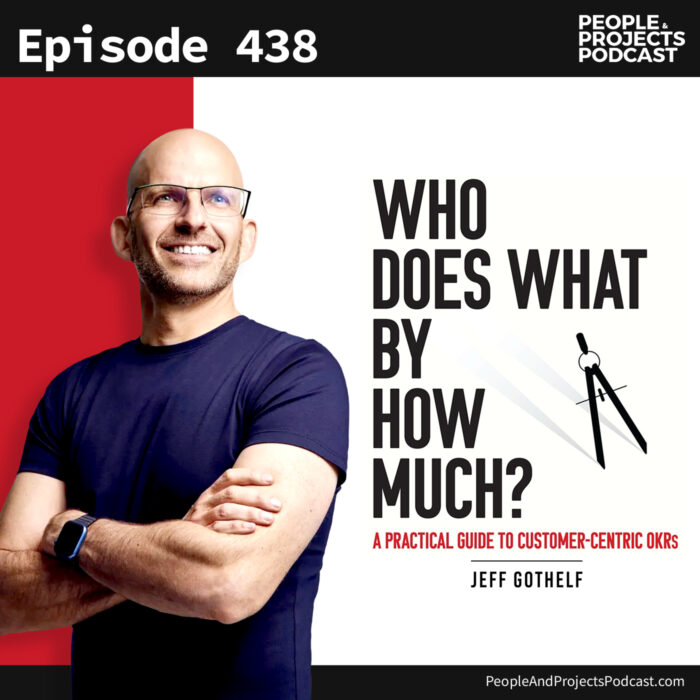In this episode, Andy talks with Jeff Gothelf about the importance of OKRs (Objectives and Key Results) as a customer-centric goal-setting framework. Based on insights from Jeff’s book Who Does What By How Much?: A Practical Guide to Customer-Centric OKRs, they explore the challenges leaders face in ensuring their teams work on the right priorities, the misconceptions surrounding OKRs, and the significance of measuring outcomes and value. Jeff emphasizes the need for organizations to focus on customer needs and behavior changes rather than just task completion. The discussion also covers how to implement OKRs effectively, starting small, and the potential for using OKRs in personal goal setting.
If you’ve ever wondered how you and your team could better drive real value for your organization and customers, this episode is for you!
Sound Bites
- “The true measure of the value of the thing that you deliver to your customer is measuring outcomes—meaningful changes in their behavior.”
- “The deliverable is variable. You’ve got some ideas, some hypotheses about what you might make, but the measure of success is not the development and deployment of that thing—it’s the behavior change.”
- “You know you’ve written a good key result when it literally spells out: ‘who does what by how much,’ which is the name of the book.”
- “Everyone’s got a customer. The true measure of value is measuring outcomes, meaningful changes in their behavior. And that’s applicable in every scenario.”
- “It’s infinitely easier for someone to just tell you what to do. Honestly, it’s easier for the person telling you what to do, and for a lot of folks, they’re just like ‘tell me what to do, and I’ll do it.'”
- “By the time we decide what to work on to the time that it actually comes out in the market, a lot of that consumer demand has moved on or shifted.”
- “One of the biggest challenges is getting folks to start questioning whether the work they’re doing actually solves a real problem in a meaningful way.”
- “The incentives for a lot of teams are to produce a thing, and then they get measured, rewarded, and promoted based on that. Rarely do we ask: did anyone need that thing?”
- “Make them successful, respect their time, solve real problems in meaningful ways, and make it a delight to use.”
Chapters
- 00:00 Introduction
- 01:39 Start Of Interview
- 01:49 Why Do People Work On The Wrong Stuff?
- 04:07 Why Is It Difficult To Get Alignment, Collaboration, And Strategy Focus?
- 05:10 How Do You Like To Introduce People To OKRs?
- 07:46 What Are Some Common Misconceptions About OKRs?
- 10:41 How Do You Define Value?
- 13:05 What Do You Mean By An Outcome?
- 17:36 How Do You Go About Starting An OKR System?
- 20:48 Can OKRs Work For Teams If The Overall Company Doesn’t Use Them?
- 24:35 End Of Interview
- 24:55 Andy Comments After The Interview
- 28:07 Outtakes
Learn More
To learn more about this topic, check out these episodes:
- Episode 328, with Terry Schmidt about LogFrames. It’s different from OKRs, but it’s another way to strategically think through the work we’re doing.
- Episode 127, with Rob-Jan de Jong. It’s a strategy book that can help with delivering a vision for an organization or team.
You can learn more about Jeff and his book at JeffGothelf.com.
AI for Project Managers and Leaders
With the constant stream of AI news, it’s sometimes hard to grasp how these advancements can benefit us as project managers and leaders in our day-to-day work. That’s why I developed our e-learning course: AI Made Simple: A Practical Guide to Using AI in Your Everyday Work.
This self-guided course is designed for project managers and leaders aiming to harness AI’s potential to enhance your work, streamline your workflow, and boost your productivity.
Go to ai.i-leadonline.com to learn more and join us. The feedback from the program has been fantastic. Take this opportunity to unlock the potential of AI for your team and projects.
Thank you for joining me for this episode of The People and Projects Podcast!
Talent Triangle: Business Acumen
Topics: Project Management, OKRs, Leadership, Customer-Centric, Goal Setting, Business Strategy, Outcomes, Value Measurement, Implementation, Personal Growth
The following music was used for this episode:
Music: Underground Shadows by MusicLFiles
License (CC BY 4.0): https://filmmusic.io/standard-license
Music: Energetic Drive Indie Rock by Winnie the Moog
License (CC BY 4.0): https://filmmusic.io/standard-license

